Individual Report 1: Employee Motivation Factors and Job Role Analysis
VerifiedAdded on 2022/12/26
|8
|2158
|36
Report
AI Summary
This individual report delves into the multifaceted concept of employee motivation, examining the various factors that influence it, such as rewards, recognition, and work-life balance. It begins with an introduction to motivation and its significance in achieving organizational goals, followed by an exploration of Maslow's Hierarchy of Needs as a framework for understanding employee requirements. The report then analyzes positive and negative factors within various job roles, including marketing manager, product manager, project manager, finance manager, and human resource manager. The positive aspects discussed include the ability to work digitally, creative approaches, effective resource utilization, better profit maximization, and effective communication. The negative aspects highlighted are long working hours, single-person responsibility for failures, lack of creativity, inability to recognize deviations, and inability to solve conflicts. The report concludes by emphasizing the importance of motivation in enhancing employee performance and organizational success.
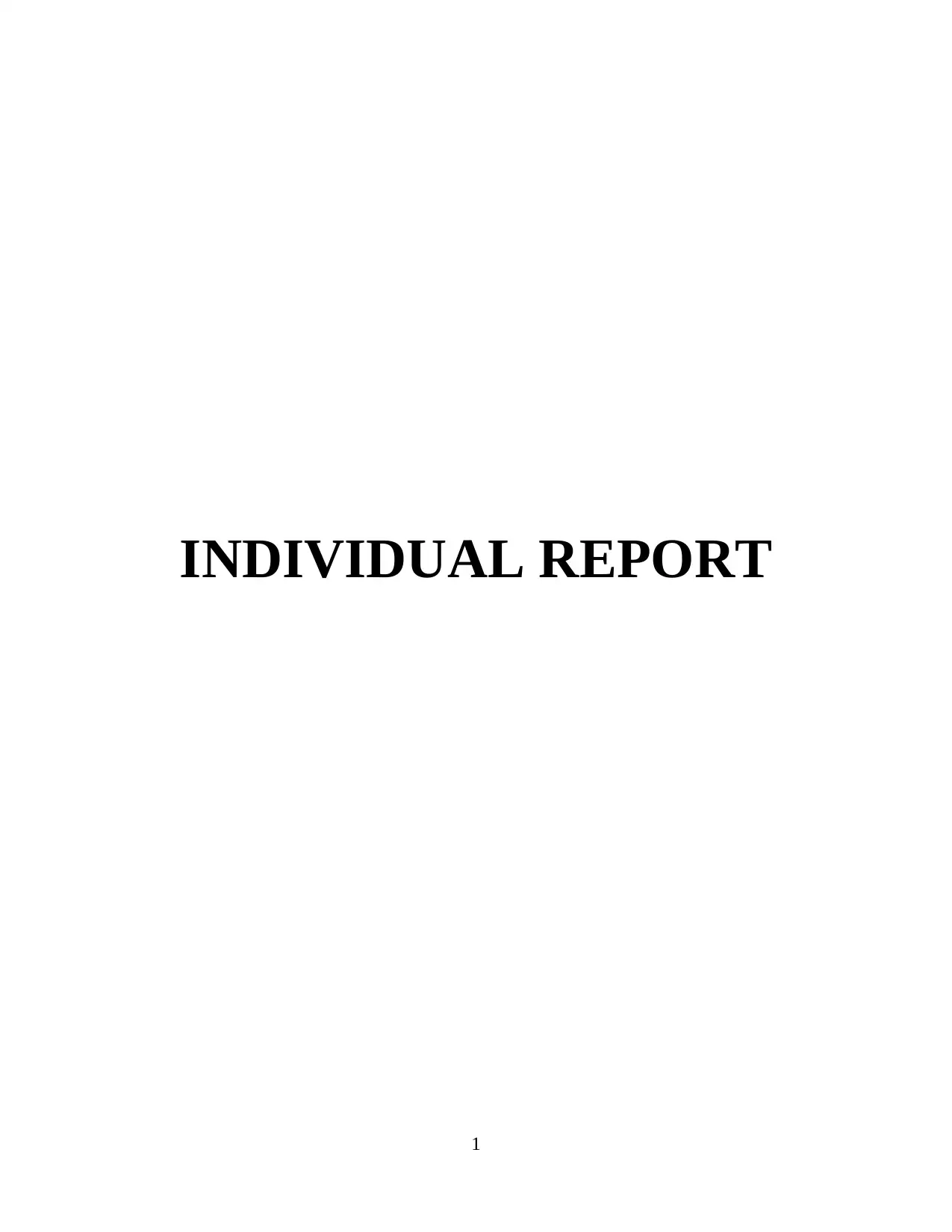
INDIVIDUAL REPORT
1
1
Paraphrase This Document
Need a fresh take? Get an instant paraphrase of this document with our AI Paraphraser
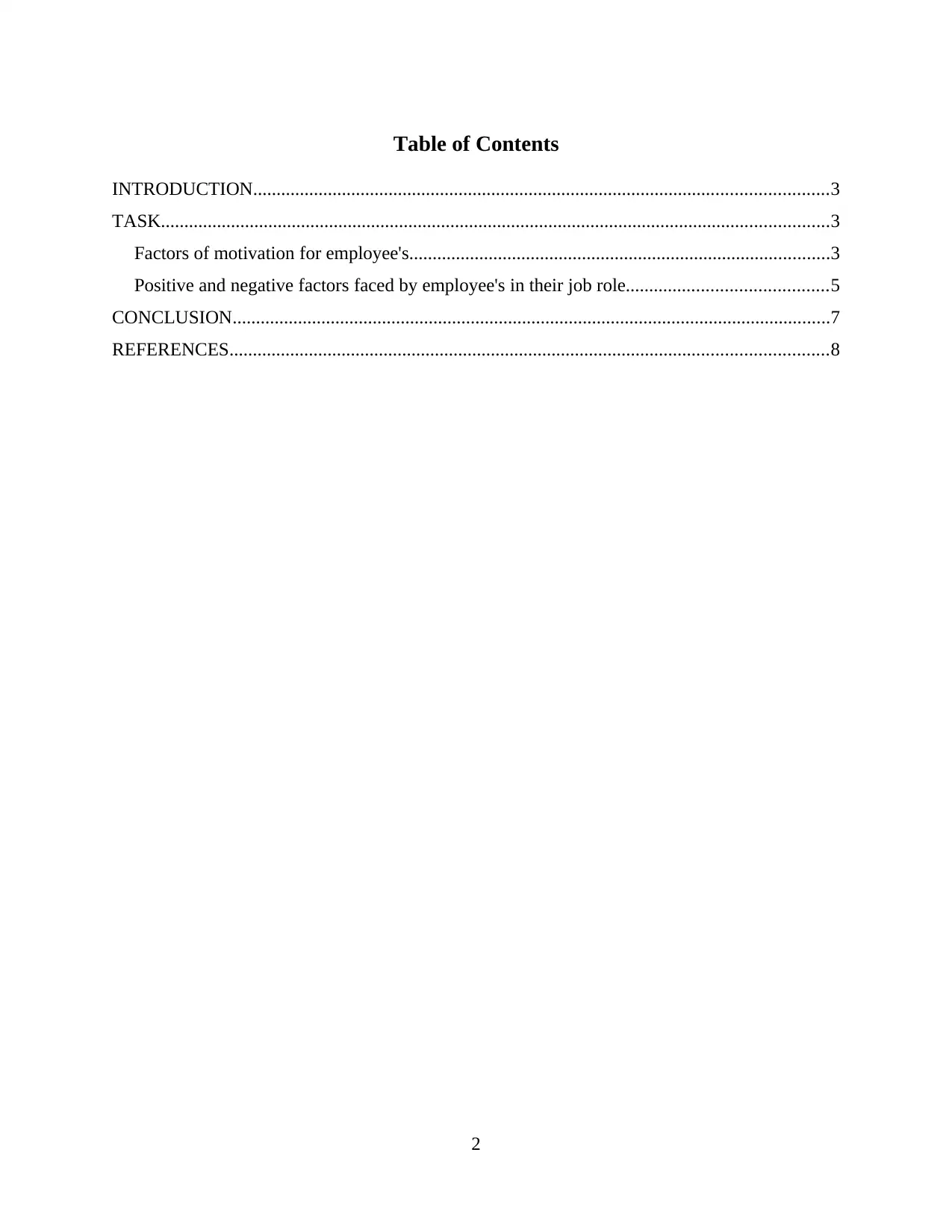
Table of Contents
INTRODUCTION...........................................................................................................................3
TASK...............................................................................................................................................3
Factors of motivation for employee's..........................................................................................3
Positive and negative factors faced by employee's in their job role...........................................5
CONCLUSION................................................................................................................................7
REFERENCES................................................................................................................................8
2
INTRODUCTION...........................................................................................................................3
TASK...............................................................................................................................................3
Factors of motivation for employee's..........................................................................................3
Positive and negative factors faced by employee's in their job role...........................................5
CONCLUSION................................................................................................................................7
REFERENCES................................................................................................................................8
2
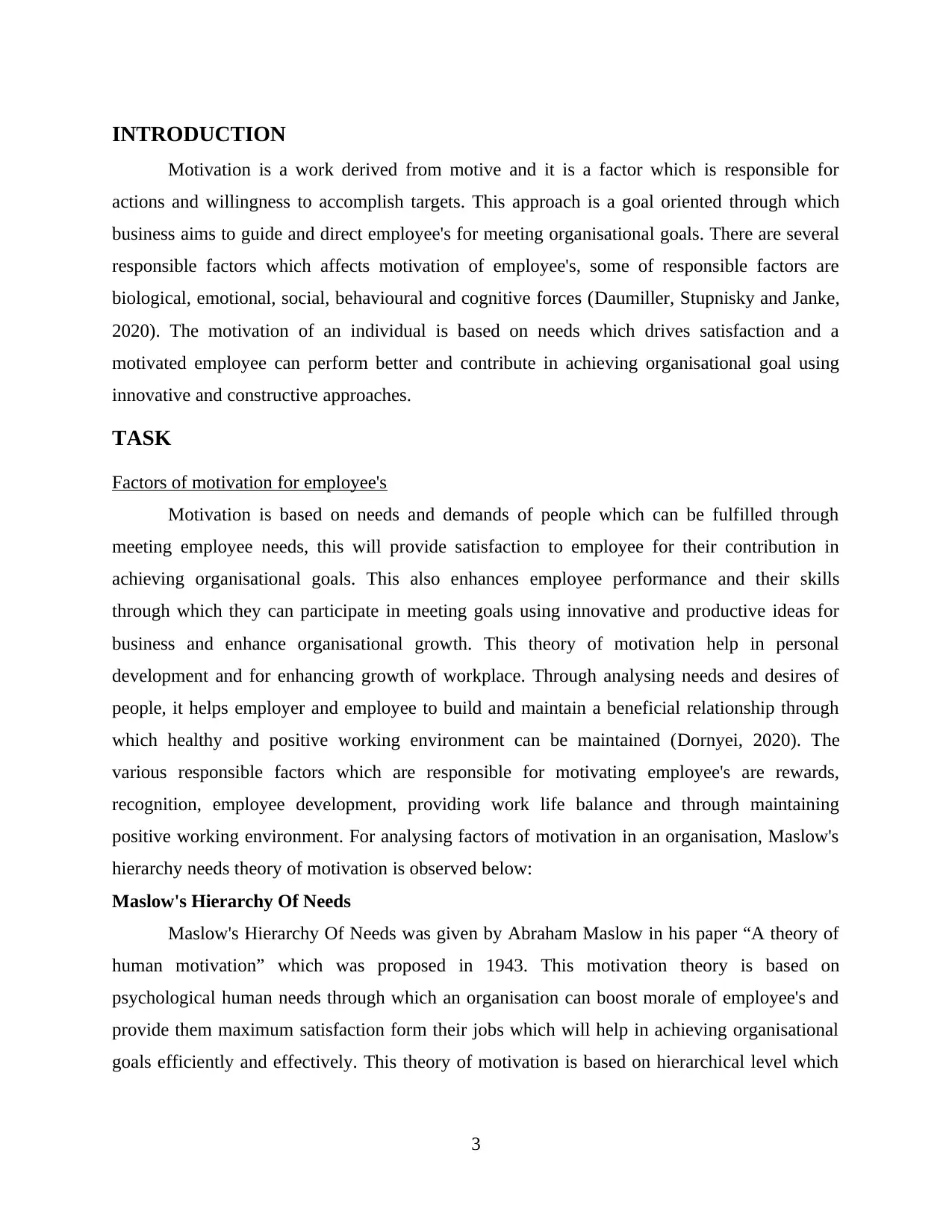
INTRODUCTION
Motivation is a work derived from motive and it is a factor which is responsible for
actions and willingness to accomplish targets. This approach is a goal oriented through which
business aims to guide and direct employee's for meeting organisational goals. There are several
responsible factors which affects motivation of employee's, some of responsible factors are
biological, emotional, social, behavioural and cognitive forces (Daumiller, Stupnisky and Janke,
2020). The motivation of an individual is based on needs which drives satisfaction and a
motivated employee can perform better and contribute in achieving organisational goal using
innovative and constructive approaches.
TASK
Factors of motivation for employee's
Motivation is based on needs and demands of people which can be fulfilled through
meeting employee needs, this will provide satisfaction to employee for their contribution in
achieving organisational goals. This also enhances employee performance and their skills
through which they can participate in meeting goals using innovative and productive ideas for
business and enhance organisational growth. This theory of motivation help in personal
development and for enhancing growth of workplace. Through analysing needs and desires of
people, it helps employer and employee to build and maintain a beneficial relationship through
which healthy and positive working environment can be maintained (Dornyei, 2020). The
various responsible factors which are responsible for motivating employee's are rewards,
recognition, employee development, providing work life balance and through maintaining
positive working environment. For analysing factors of motivation in an organisation, Maslow's
hierarchy needs theory of motivation is observed below:
Maslow's Hierarchy Of Needs
Maslow's Hierarchy Of Needs was given by Abraham Maslow in his paper “A theory of
human motivation” which was proposed in 1943. This motivation theory is based on
psychological human needs through which an organisation can boost morale of employee's and
provide them maximum satisfaction form their jobs which will help in achieving organisational
goals efficiently and effectively. This theory of motivation is based on hierarchical level which
3
Motivation is a work derived from motive and it is a factor which is responsible for
actions and willingness to accomplish targets. This approach is a goal oriented through which
business aims to guide and direct employee's for meeting organisational goals. There are several
responsible factors which affects motivation of employee's, some of responsible factors are
biological, emotional, social, behavioural and cognitive forces (Daumiller, Stupnisky and Janke,
2020). The motivation of an individual is based on needs which drives satisfaction and a
motivated employee can perform better and contribute in achieving organisational goal using
innovative and constructive approaches.
TASK
Factors of motivation for employee's
Motivation is based on needs and demands of people which can be fulfilled through
meeting employee needs, this will provide satisfaction to employee for their contribution in
achieving organisational goals. This also enhances employee performance and their skills
through which they can participate in meeting goals using innovative and productive ideas for
business and enhance organisational growth. This theory of motivation help in personal
development and for enhancing growth of workplace. Through analysing needs and desires of
people, it helps employer and employee to build and maintain a beneficial relationship through
which healthy and positive working environment can be maintained (Dornyei, 2020). The
various responsible factors which are responsible for motivating employee's are rewards,
recognition, employee development, providing work life balance and through maintaining
positive working environment. For analysing factors of motivation in an organisation, Maslow's
hierarchy needs theory of motivation is observed below:
Maslow's Hierarchy Of Needs
Maslow's Hierarchy Of Needs was given by Abraham Maslow in his paper “A theory of
human motivation” which was proposed in 1943. This motivation theory is based on
psychological human needs through which an organisation can boost morale of employee's and
provide them maximum satisfaction form their jobs which will help in achieving organisational
goals efficiently and effectively. This theory of motivation is based on hierarchical level which
3
⊘ This is a preview!⊘
Do you want full access?
Subscribe today to unlock all pages.

Trusted by 1+ million students worldwide
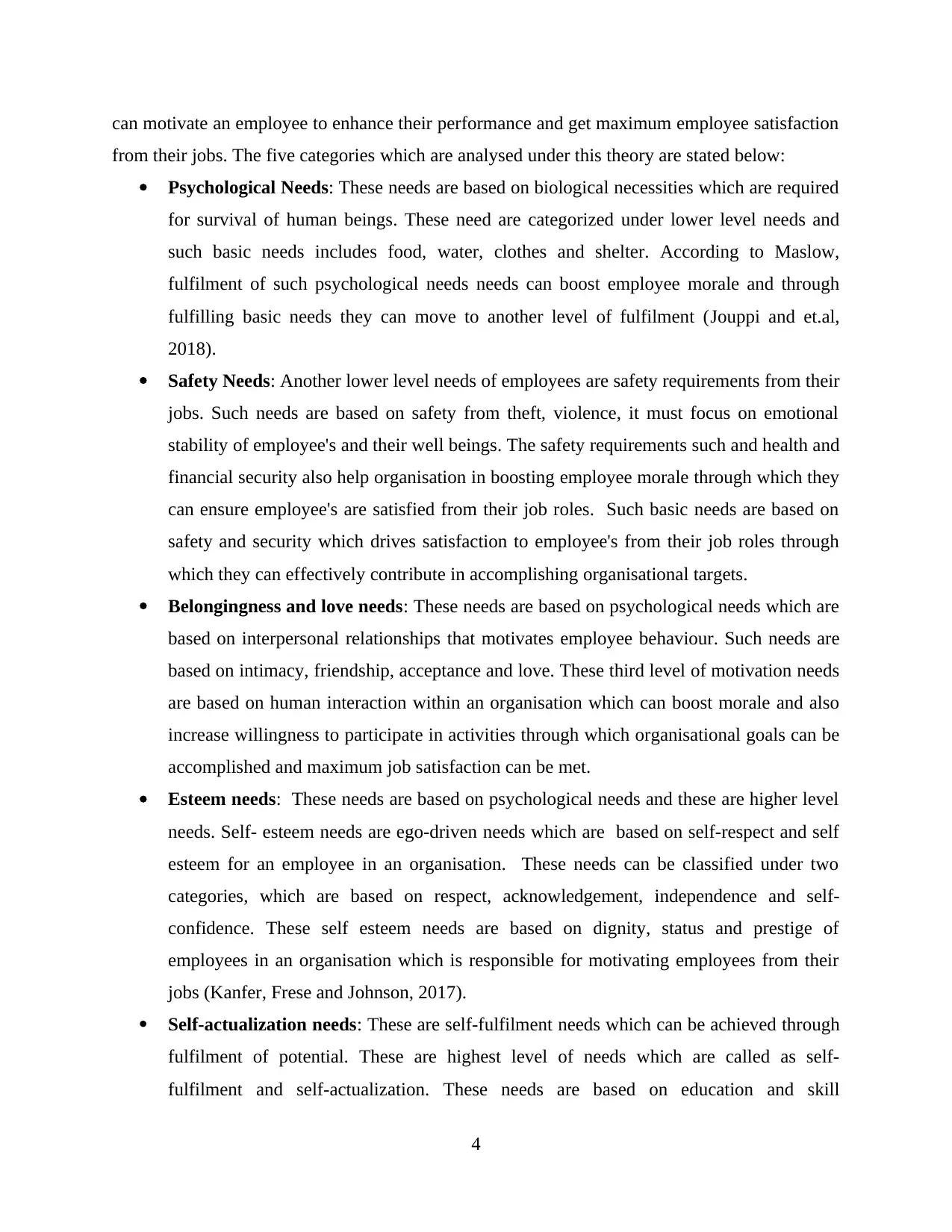
can motivate an employee to enhance their performance and get maximum employee satisfaction
from their jobs. The five categories which are analysed under this theory are stated below:
Psychological Needs: These needs are based on biological necessities which are required
for survival of human beings. These need are categorized under lower level needs and
such basic needs includes food, water, clothes and shelter. According to Maslow,
fulfilment of such psychological needs needs can boost employee morale and through
fulfilling basic needs they can move to another level of fulfilment (Jouppi and et.al,
2018).
Safety Needs: Another lower level needs of employees are safety requirements from their
jobs. Such needs are based on safety from theft, violence, it must focus on emotional
stability of employee's and their well beings. The safety requirements such and health and
financial security also help organisation in boosting employee morale through which they
can ensure employee's are satisfied from their job roles. Such basic needs are based on
safety and security which drives satisfaction to employee's from their job roles through
which they can effectively contribute in accomplishing organisational targets.
Belongingness and love needs: These needs are based on psychological needs which are
based on interpersonal relationships that motivates employee behaviour. Such needs are
based on intimacy, friendship, acceptance and love. These third level of motivation needs
are based on human interaction within an organisation which can boost morale and also
increase willingness to participate in activities through which organisational goals can be
accomplished and maximum job satisfaction can be met.
Esteem needs: These needs are based on psychological needs and these are higher level
needs. Self- esteem needs are ego-driven needs which are based on self-respect and self
esteem for an employee in an organisation. These needs can be classified under two
categories, which are based on respect, acknowledgement, independence and self-
confidence. These self esteem needs are based on dignity, status and prestige of
employees in an organisation which is responsible for motivating employees from their
jobs (Kanfer, Frese and Johnson, 2017).
Self-actualization needs: These are self-fulfilment needs which can be achieved through
fulfilment of potential. These are highest level of needs which are called as self-
fulfilment and self-actualization. These needs are based on education and skill
4
from their jobs. The five categories which are analysed under this theory are stated below:
Psychological Needs: These needs are based on biological necessities which are required
for survival of human beings. These need are categorized under lower level needs and
such basic needs includes food, water, clothes and shelter. According to Maslow,
fulfilment of such psychological needs needs can boost employee morale and through
fulfilling basic needs they can move to another level of fulfilment (Jouppi and et.al,
2018).
Safety Needs: Another lower level needs of employees are safety requirements from their
jobs. Such needs are based on safety from theft, violence, it must focus on emotional
stability of employee's and their well beings. The safety requirements such and health and
financial security also help organisation in boosting employee morale through which they
can ensure employee's are satisfied from their job roles. Such basic needs are based on
safety and security which drives satisfaction to employee's from their job roles through
which they can effectively contribute in accomplishing organisational targets.
Belongingness and love needs: These needs are based on psychological needs which are
based on interpersonal relationships that motivates employee behaviour. Such needs are
based on intimacy, friendship, acceptance and love. These third level of motivation needs
are based on human interaction within an organisation which can boost morale and also
increase willingness to participate in activities through which organisational goals can be
accomplished and maximum job satisfaction can be met.
Esteem needs: These needs are based on psychological needs and these are higher level
needs. Self- esteem needs are ego-driven needs which are based on self-respect and self
esteem for an employee in an organisation. These needs can be classified under two
categories, which are based on respect, acknowledgement, independence and self-
confidence. These self esteem needs are based on dignity, status and prestige of
employees in an organisation which is responsible for motivating employees from their
jobs (Kanfer, Frese and Johnson, 2017).
Self-actualization needs: These are self-fulfilment needs which can be achieved through
fulfilment of potential. These are highest level of needs which are called as self-
fulfilment and self-actualization. These needs are based on education and skill
4
Paraphrase This Document
Need a fresh take? Get an instant paraphrase of this document with our AI Paraphraser
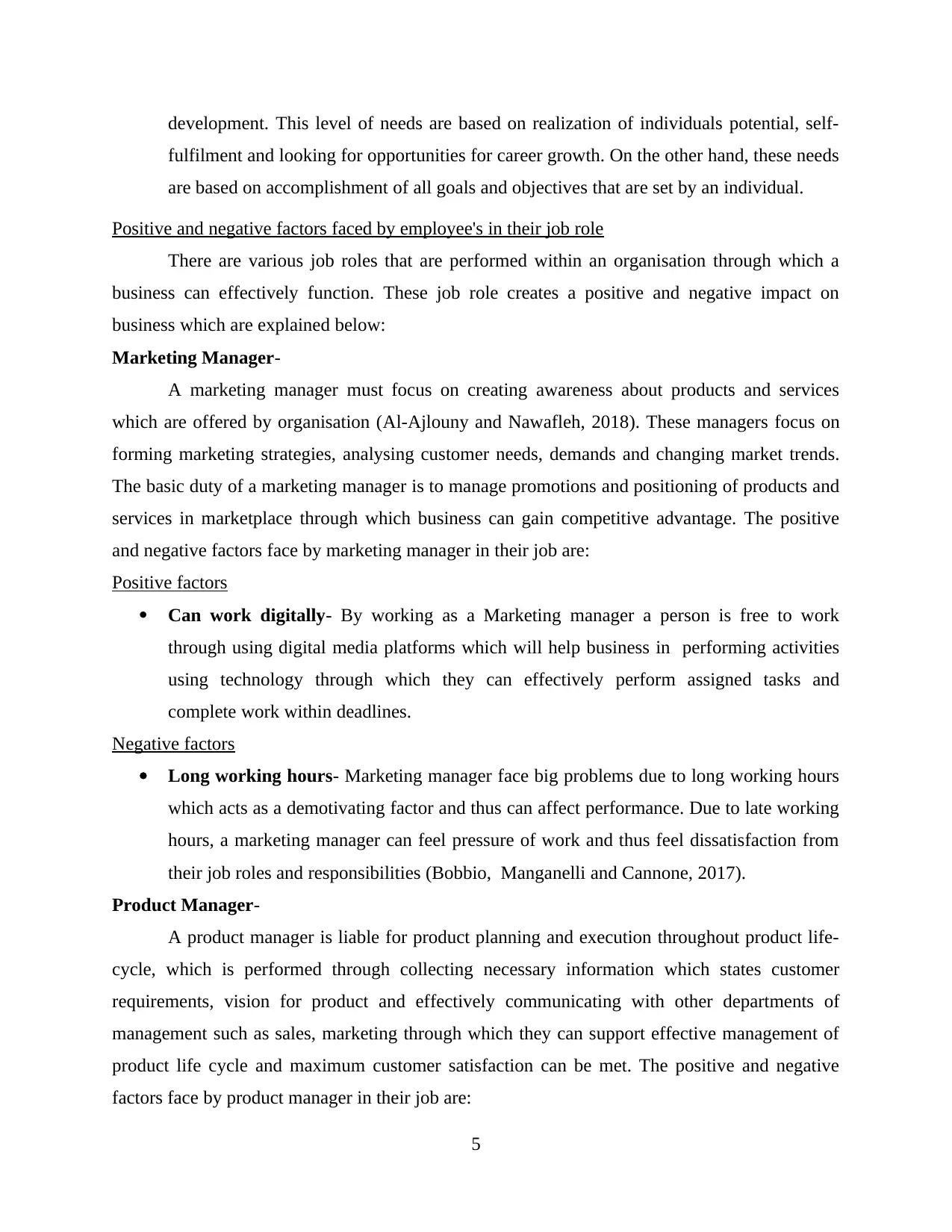
development. This level of needs are based on realization of individuals potential, self-
fulfilment and looking for opportunities for career growth. On the other hand, these needs
are based on accomplishment of all goals and objectives that are set by an individual.
Positive and negative factors faced by employee's in their job role
There are various job roles that are performed within an organisation through which a
business can effectively function. These job role creates a positive and negative impact on
business which are explained below:
Marketing Manager-
A marketing manager must focus on creating awareness about products and services
which are offered by organisation (Al-Ajlouny and Nawafleh, 2018). These managers focus on
forming marketing strategies, analysing customer needs, demands and changing market trends.
The basic duty of a marketing manager is to manage promotions and positioning of products and
services in marketplace through which business can gain competitive advantage. The positive
and negative factors face by marketing manager in their job are:
Positive factors
Can work digitally- By working as a Marketing manager a person is free to work
through using digital media platforms which will help business in performing activities
using technology through which they can effectively perform assigned tasks and
complete work within deadlines.
Negative factors
Long working hours- Marketing manager face big problems due to long working hours
which acts as a demotivating factor and thus can affect performance. Due to late working
hours, a marketing manager can feel pressure of work and thus feel dissatisfaction from
their job roles and responsibilities (Bobbio, Manganelli and Cannone, 2017).
Product Manager-
A product manager is liable for product planning and execution throughout product life-
cycle, which is performed through collecting necessary information which states customer
requirements, vision for product and effectively communicating with other departments of
management such as sales, marketing through which they can support effective management of
product life cycle and maximum customer satisfaction can be met. The positive and negative
factors face by product manager in their job are:
5
fulfilment and looking for opportunities for career growth. On the other hand, these needs
are based on accomplishment of all goals and objectives that are set by an individual.
Positive and negative factors faced by employee's in their job role
There are various job roles that are performed within an organisation through which a
business can effectively function. These job role creates a positive and negative impact on
business which are explained below:
Marketing Manager-
A marketing manager must focus on creating awareness about products and services
which are offered by organisation (Al-Ajlouny and Nawafleh, 2018). These managers focus on
forming marketing strategies, analysing customer needs, demands and changing market trends.
The basic duty of a marketing manager is to manage promotions and positioning of products and
services in marketplace through which business can gain competitive advantage. The positive
and negative factors face by marketing manager in their job are:
Positive factors
Can work digitally- By working as a Marketing manager a person is free to work
through using digital media platforms which will help business in performing activities
using technology through which they can effectively perform assigned tasks and
complete work within deadlines.
Negative factors
Long working hours- Marketing manager face big problems due to long working hours
which acts as a demotivating factor and thus can affect performance. Due to late working
hours, a marketing manager can feel pressure of work and thus feel dissatisfaction from
their job roles and responsibilities (Bobbio, Manganelli and Cannone, 2017).
Product Manager-
A product manager is liable for product planning and execution throughout product life-
cycle, which is performed through collecting necessary information which states customer
requirements, vision for product and effectively communicating with other departments of
management such as sales, marketing through which they can support effective management of
product life cycle and maximum customer satisfaction can be met. The positive and negative
factors face by product manager in their job are:
5
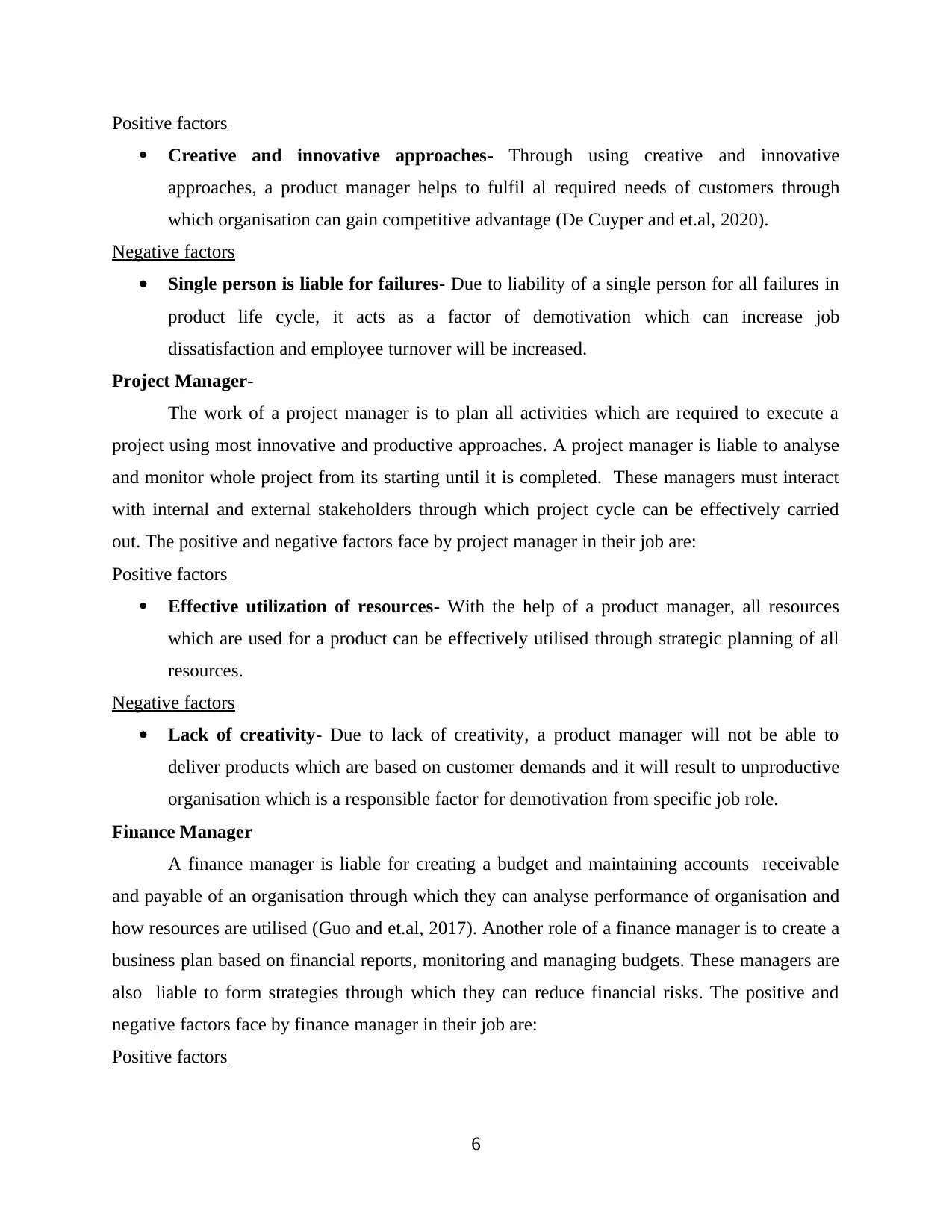
Positive factors
Creative and innovative approaches- Through using creative and innovative
approaches, a product manager helps to fulfil al required needs of customers through
which organisation can gain competitive advantage (De Cuyper and et.al, 2020).
Negative factors
Single person is liable for failures- Due to liability of a single person for all failures in
product life cycle, it acts as a factor of demotivation which can increase job
dissatisfaction and employee turnover will be increased.
Project Manager-
The work of a project manager is to plan all activities which are required to execute a
project using most innovative and productive approaches. A project manager is liable to analyse
and monitor whole project from its starting until it is completed. These managers must interact
with internal and external stakeholders through which project cycle can be effectively carried
out. The positive and negative factors face by project manager in their job are:
Positive factors
Effective utilization of resources- With the help of a product manager, all resources
which are used for a product can be effectively utilised through strategic planning of all
resources.
Negative factors
Lack of creativity- Due to lack of creativity, a product manager will not be able to
deliver products which are based on customer demands and it will result to unproductive
organisation which is a responsible factor for demotivation from specific job role.
Finance Manager
A finance manager is liable for creating a budget and maintaining accounts receivable
and payable of an organisation through which they can analyse performance of organisation and
how resources are utilised (Guo and et.al, 2017). Another role of a finance manager is to create a
business plan based on financial reports, monitoring and managing budgets. These managers are
also liable to form strategies through which they can reduce financial risks. The positive and
negative factors face by finance manager in their job are:
Positive factors
6
Creative and innovative approaches- Through using creative and innovative
approaches, a product manager helps to fulfil al required needs of customers through
which organisation can gain competitive advantage (De Cuyper and et.al, 2020).
Negative factors
Single person is liable for failures- Due to liability of a single person for all failures in
product life cycle, it acts as a factor of demotivation which can increase job
dissatisfaction and employee turnover will be increased.
Project Manager-
The work of a project manager is to plan all activities which are required to execute a
project using most innovative and productive approaches. A project manager is liable to analyse
and monitor whole project from its starting until it is completed. These managers must interact
with internal and external stakeholders through which project cycle can be effectively carried
out. The positive and negative factors face by project manager in their job are:
Positive factors
Effective utilization of resources- With the help of a product manager, all resources
which are used for a product can be effectively utilised through strategic planning of all
resources.
Negative factors
Lack of creativity- Due to lack of creativity, a product manager will not be able to
deliver products which are based on customer demands and it will result to unproductive
organisation which is a responsible factor for demotivation from specific job role.
Finance Manager
A finance manager is liable for creating a budget and maintaining accounts receivable
and payable of an organisation through which they can analyse performance of organisation and
how resources are utilised (Guo and et.al, 2017). Another role of a finance manager is to create a
business plan based on financial reports, monitoring and managing budgets. These managers are
also liable to form strategies through which they can reduce financial risks. The positive and
negative factors face by finance manager in their job are:
Positive factors
6
⊘ This is a preview!⊘
Do you want full access?
Subscribe today to unlock all pages.

Trusted by 1+ million students worldwide
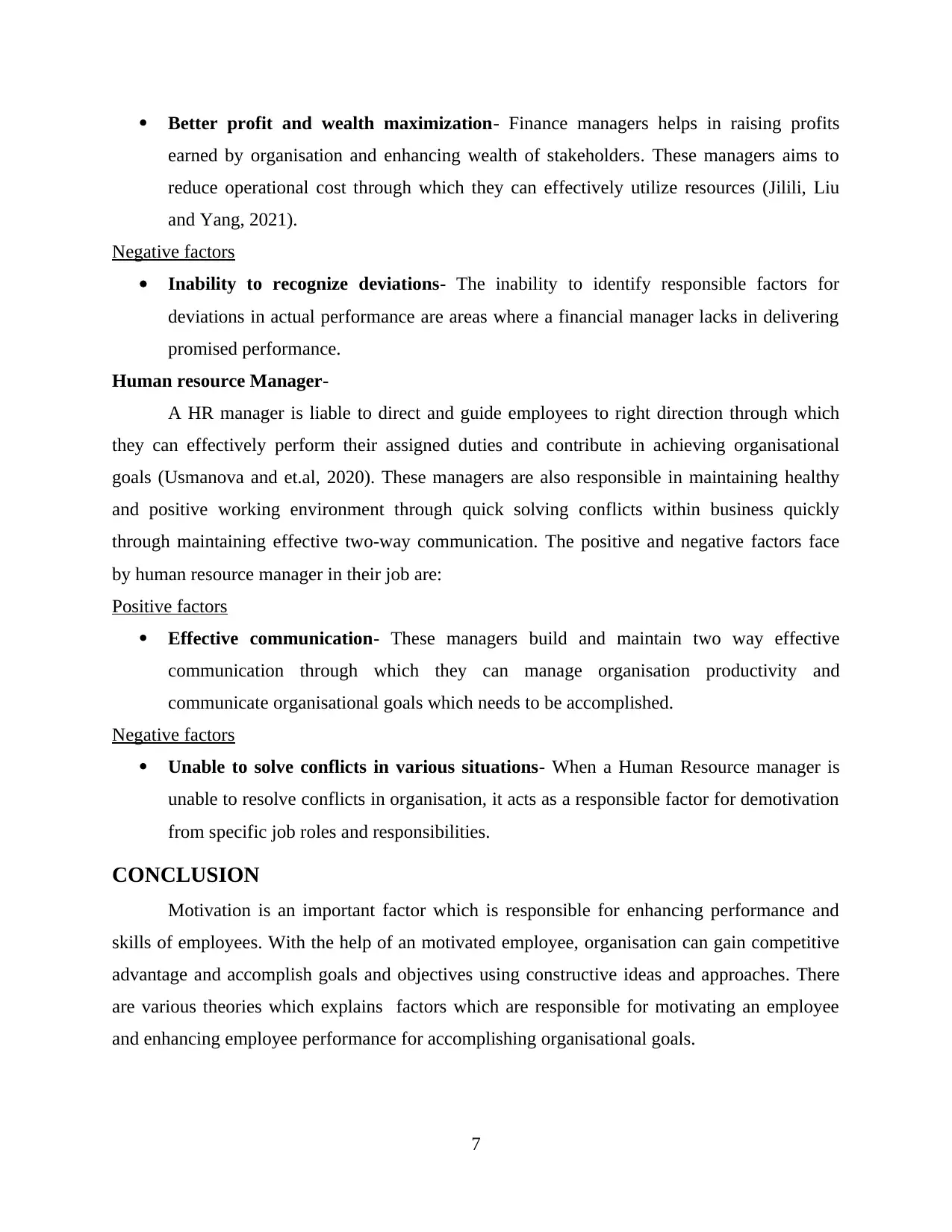
Better profit and wealth maximization- Finance managers helps in raising profits
earned by organisation and enhancing wealth of stakeholders. These managers aims to
reduce operational cost through which they can effectively utilize resources (Jilili, Liu
and Yang, 2021).
Negative factors
Inability to recognize deviations- The inability to identify responsible factors for
deviations in actual performance are areas where a financial manager lacks in delivering
promised performance.
Human resource Manager-
A HR manager is liable to direct and guide employees to right direction through which
they can effectively perform their assigned duties and contribute in achieving organisational
goals (Usmanova and et.al, 2020). These managers are also responsible in maintaining healthy
and positive working environment through quick solving conflicts within business quickly
through maintaining effective two-way communication. The positive and negative factors face
by human resource manager in their job are:
Positive factors
Effective communication- These managers build and maintain two way effective
communication through which they can manage organisation productivity and
communicate organisational goals which needs to be accomplished.
Negative factors
Unable to solve conflicts in various situations- When a Human Resource manager is
unable to resolve conflicts in organisation, it acts as a responsible factor for demotivation
from specific job roles and responsibilities.
CONCLUSION
Motivation is an important factor which is responsible for enhancing performance and
skills of employees. With the help of an motivated employee, organisation can gain competitive
advantage and accomplish goals and objectives using constructive ideas and approaches. There
are various theories which explains factors which are responsible for motivating an employee
and enhancing employee performance for accomplishing organisational goals.
7
earned by organisation and enhancing wealth of stakeholders. These managers aims to
reduce operational cost through which they can effectively utilize resources (Jilili, Liu
and Yang, 2021).
Negative factors
Inability to recognize deviations- The inability to identify responsible factors for
deviations in actual performance are areas where a financial manager lacks in delivering
promised performance.
Human resource Manager-
A HR manager is liable to direct and guide employees to right direction through which
they can effectively perform their assigned duties and contribute in achieving organisational
goals (Usmanova and et.al, 2020). These managers are also responsible in maintaining healthy
and positive working environment through quick solving conflicts within business quickly
through maintaining effective two-way communication. The positive and negative factors face
by human resource manager in their job are:
Positive factors
Effective communication- These managers build and maintain two way effective
communication through which they can manage organisation productivity and
communicate organisational goals which needs to be accomplished.
Negative factors
Unable to solve conflicts in various situations- When a Human Resource manager is
unable to resolve conflicts in organisation, it acts as a responsible factor for demotivation
from specific job roles and responsibilities.
CONCLUSION
Motivation is an important factor which is responsible for enhancing performance and
skills of employees. With the help of an motivated employee, organisation can gain competitive
advantage and accomplish goals and objectives using constructive ideas and approaches. There
are various theories which explains factors which are responsible for motivating an employee
and enhancing employee performance for accomplishing organisational goals.
7
Paraphrase This Document
Need a fresh take? Get an instant paraphrase of this document with our AI Paraphraser
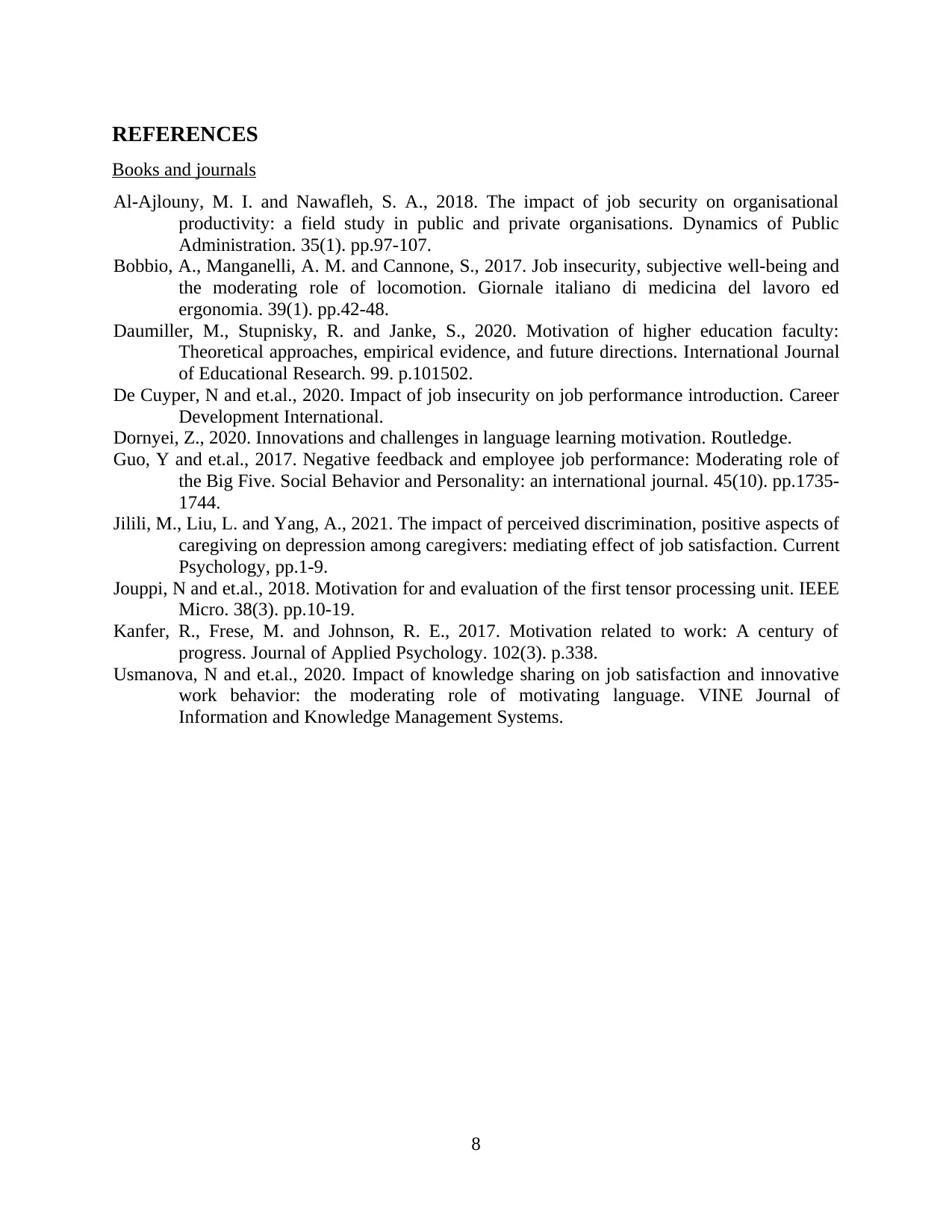
REFERENCES
Books and journals
Al-Ajlouny, M. I. and Nawafleh, S. A., 2018. The impact of job security on organisational
productivity: a field study in public and private organisations. Dynamics of Public
Administration. 35(1). pp.97-107.
Bobbio, A., Manganelli, A. M. and Cannone, S., 2017. Job insecurity, subjective well-being and
the moderating role of locomotion. Giornale italiano di medicina del lavoro ed
ergonomia. 39(1). pp.42-48.
Daumiller, M., Stupnisky, R. and Janke, S., 2020. Motivation of higher education faculty:
Theoretical approaches, empirical evidence, and future directions. International Journal
of Educational Research. 99. p.101502.
De Cuyper, N and et.al., 2020. Impact of job insecurity on job performance introduction. Career
Development International.
Dornyei, Z., 2020. Innovations and challenges in language learning motivation. Routledge.
Guo, Y and et.al., 2017. Negative feedback and employee job performance: Moderating role of
the Big Five. Social Behavior and Personality: an international journal. 45(10). pp.1735-
1744.
Jilili, M., Liu, L. and Yang, A., 2021. The impact of perceived discrimination, positive aspects of
caregiving on depression among caregivers: mediating effect of job satisfaction. Current
Psychology, pp.1-9.
Jouppi, N and et.al., 2018. Motivation for and evaluation of the first tensor processing unit. IEEE
Micro. 38(3). pp.10-19.
Kanfer, R., Frese, M. and Johnson, R. E., 2017. Motivation related to work: A century of
progress. Journal of Applied Psychology. 102(3). p.338.
Usmanova, N and et.al., 2020. Impact of knowledge sharing on job satisfaction and innovative
work behavior: the moderating role of motivating language. VINE Journal of
Information and Knowledge Management Systems.
8
Books and journals
Al-Ajlouny, M. I. and Nawafleh, S. A., 2018. The impact of job security on organisational
productivity: a field study in public and private organisations. Dynamics of Public
Administration. 35(1). pp.97-107.
Bobbio, A., Manganelli, A. M. and Cannone, S., 2017. Job insecurity, subjective well-being and
the moderating role of locomotion. Giornale italiano di medicina del lavoro ed
ergonomia. 39(1). pp.42-48.
Daumiller, M., Stupnisky, R. and Janke, S., 2020. Motivation of higher education faculty:
Theoretical approaches, empirical evidence, and future directions. International Journal
of Educational Research. 99. p.101502.
De Cuyper, N and et.al., 2020. Impact of job insecurity on job performance introduction. Career
Development International.
Dornyei, Z., 2020. Innovations and challenges in language learning motivation. Routledge.
Guo, Y and et.al., 2017. Negative feedback and employee job performance: Moderating role of
the Big Five. Social Behavior and Personality: an international journal. 45(10). pp.1735-
1744.
Jilili, M., Liu, L. and Yang, A., 2021. The impact of perceived discrimination, positive aspects of
caregiving on depression among caregivers: mediating effect of job satisfaction. Current
Psychology, pp.1-9.
Jouppi, N and et.al., 2018. Motivation for and evaluation of the first tensor processing unit. IEEE
Micro. 38(3). pp.10-19.
Kanfer, R., Frese, M. and Johnson, R. E., 2017. Motivation related to work: A century of
progress. Journal of Applied Psychology. 102(3). p.338.
Usmanova, N and et.al., 2020. Impact of knowledge sharing on job satisfaction and innovative
work behavior: the moderating role of motivating language. VINE Journal of
Information and Knowledge Management Systems.
8
1 out of 8
Related Documents
Your All-in-One AI-Powered Toolkit for Academic Success.
+13062052269
info@desklib.com
Available 24*7 on WhatsApp / Email
![[object Object]](/_next/static/media/star-bottom.7253800d.svg)
Unlock your academic potential
Copyright © 2020–2026 A2Z Services. All Rights Reserved. Developed and managed by ZUCOL.




